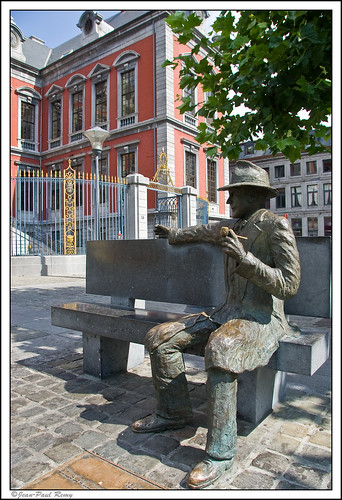The familiar prompt every student has been instructed to use on a September paper has been: What I Did on My Summer Vacation. To that, a writer would have to reply: What is a vacation?
I don't know a writer who takes a real vacation any more. If they travel, it's often for research for a work-in-progress or in search of a work-in-progress.
Forget not taking a computer as a way to force yourself into relaxing and not "working" -- it won't work. We'll use the cell phone's notepad, pads supplied by the hotel and napkins in the restaurants to scribble great ideas we won't want to lose.
One would believe a writer could depend on a good memory since we write vivid descriptions of details others may not notice or recollect as clear, but alas, most of us have indeed lost wonderful ideas that came to us at a time when we were unable to jot down a notation to jog our memory later -- or worse, not be able to read our own writing the next morning or remember what the cryptic message meant.
A vacation without writing seems impossible, so I thought I had a solution: I enrolled in a couple of college classes I assumed would aid my writing and keep me too busy to work on an actual project. I chose Philosophy and Psychology, figuring both would be a boost to my deciding what my characters might do in certain situations.
My downfall was having interesting instructors who encouraged discussion.
We watched films in Philosophy and discussed how the subject matter worked (or not) in today's society. Philosphy, religion and a director, writer and actors choices determined how the film "moved us" as an audience. So much for not playing my own What if game with those choices. My mind went into overload of ideas.
In Psychology, we learned why people may act differently from one another. The instructor brought a hypnotist to class and he gave a demonstration and answered questions. (Guess who not only had more than a few questions, but also volunteered to be one of the subjects just so I'd know how that felt?)
Both classes had discussions about those who lived under different circumstances than our own. Talk about wonderful research for characters -- both classes were filled with interesting characters.
The Philosphy class contained the usual suspects of college-age students and a mix of varied ages and backgrounds.
A biker with a gray beard who argued belief in God turned out to be a Viet Nam veteran who had returned to college on a full scholarship. I'm not completely sure, but from some of his opinions, I think he was a stanch Republican.
His counterpart was originally from Oregon and extremely Liberal in his point of view. One day he decided to load up the kids and his van and tour the country, ending up in Texas. He was an avowed atheist. He also professed a love for Bill Clinton, so I'm guessing he was a Democrat.
These men were polar opposites and yet both had lost their wives to death.
The Oregon man had left his home following his wife's death.
The biker's wife had been murdered behind a convenience store.
Two men who had seemingly nothing in common besides choosing to take a summer course in Philosophy, had in reality shared the same pain of losing a spouse.
That alone raised my muse from her slumber.
The Psychology class was a mixed breed of fellow students. A young racecar driver happened to know my dad (also a racecar driver), ended up the following Sunday in my church which was a surprise to us both. A man who came from Uganda was pursuing a degree to help people coming to America like himself was soft-spoken and extremely polite. One would not guess he had been chased by lions. A young woman had returned to college to become a nurse after working years in a clerical position and being fired when she was late to work because she'd been in an automobile accident. Her change of career was unexpected, but had completely changed the course of her life.
Everyone in this class knew someone who had problems with bullies, abuse or self-mutilation. (An interesting fact I was surprised to discover are tattoos and piercings are considered self-mutilation. The reasons people choose to do these things to themselves was interesting and eye-opening.)
The Muse was wide awake now and not just whispering in my ear or tickling my mind with ideas, she was shouting: Write something!
So, I did.
Vacation? I'm not sure I know what that is any more.






































